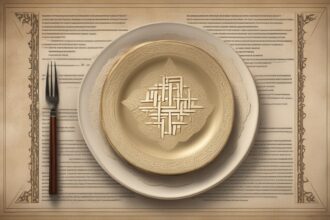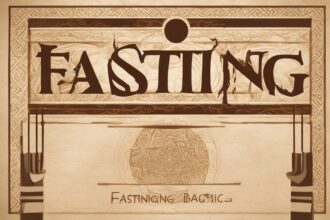Have you ever wondered how long humans have been practicing fasting, and why it’s become such a buzzword in the health and wellness world? Health fasting, the intentional abstention from food for a set period, isn’t just a modern trend—it’s a practice deeply rooted in history, culture, and even survival. From ancient religious rituals to cutting-edge scientific research, fasting has evolved over millennia, shaping how we view food, health, and spirituality. In this deep dive, we’ll explore the rich history of fasting, its impact on human health, and how you can incorporate this age-old practice into your modern lifestyle. Let’s journey through time to uncover the origins of fasting and why it remains relevant for healthy fasting practices today.
The Ancient Roots of Fasting: A Spiritual and Survival Tool
Fasting isn’t a new concept dreamed up by fitness influencers or diet gurus. It dates back thousands of years, intertwined with human survival and spirituality. In prehistoric times, fasting wasn’t always voluntary—our hunter-gatherer ancestors often went without food due to scarcity. This involuntary fasting likely trained the human body to adapt to periods of feast and famine, a concept now studied in metabolic health research (Mattson et al., 2014). But beyond survival, fasting became a deliberate act in many ancient cultures, often tied to spiritual purification.
In ancient Egypt, fasting was practiced before religious ceremonies to cleanse the body and soul. Similarly, in ancient Greece, philosophers like Socrates and Plato advocated for fasting to enhance mental clarity and self-discipline. The idea was simple: abstaining from food could elevate the mind above bodily desires. These early examples show how health fasting benefits were understood long before science could explain them. Fasting wasn’t just about the body; it was a holistic practice for mind and spirit.
Religious Fasting: A Global Tradition Across Faiths
One of the most enduring drivers of fasting has been religion. Across the globe, major faiths have incorporated fasting into their practices, often as a way to demonstrate devotion, seek forgiveness, or connect with the divine. Let’s look at a few examples of how fasting for health and spirituality became a cornerstone in religious traditions.
- Islam: During the holy month of Ramadan, Muslims fast from dawn to sunset, abstaining from food and drink as an act of worship and self-control. This practice, dating back to the 7th century, also fosters empathy for the less fortunate.
- Christianity: Fasting appears in the Bible, with Jesus fasting for 40 days in the wilderness. Early Christians often fasted during Lent, a 40-day period leading to Easter, as a form of penance and reflection.
- Judaism: Yom Kippur, the Day of Atonement, involves a 25-hour fast to focus on repentance and spiritual renewal, a tradition dating back thousands of years.
- Hinduism and Buddhism: Fasting in these traditions often aligns with specific festivals or personal vows, aimed at purifying the body and mind for spiritual growth.
These religious practices highlight how fasting transcends mere physical health—it’s a profound act of discipline and connection. Even today, many people find that fasting health tips rooted in these traditions offer mental clarity alongside physical benefits.
The Evolution of Fasting in Medicine: From Hippocrates to Modern Science
While fasting was long tied to spirituality, its role in medicine began to emerge in ancient times as well. Hippocrates, often called the “Father of Medicine,” famously said, “Instead of using medicine, rather, fast a day.” He believed fasting could help the body heal itself by giving the digestive system a rest. This idea persisted through the centuries, with fasting being prescribed for various ailments in medieval Europe and beyond.
Fast forward to the 20th century, and fasting started gaining scientific attention. In the early 1900s, doctors like Dr. Henry Tanner demonstrated the body’s resilience during prolonged fasts, surviving 40 days on water alone under medical supervision. Later, research into calorie restriction and fasting revealed potential benefits like improved insulin sensitivity and longevity (Longo & Mattson, 2014). Today, health fasting research explores how intermittent fasting—a modern take on ancient practices—can combat obesity, reduce inflammation, and even protect against neurodegenerative diseases (Patterson et al., 2017).
Fasting in the Modern Era: A Health Revolution
By the 21st century, fasting had transformed from a religious or survival tactic into a mainstream health strategy. Intermittent fasting (IF), where individuals cycle between eating and fasting periods, has exploded in popularity. Methods like the 16:8 plan (fast for 16 hours, eat during an 8-hour window) or the 5:2 diet (eat normally for 5 days, restrict calories for 2) are now household terms. Why the surge? Science backs up what ancients intuitively knew: fasting can trigger autophagy, a cellular “clean-up” process that may slow aging and reduce disease risk (Levine & Kroemer, 2019).
But it’s not just about weight loss or longevity. Many people report better focus, energy, and emotional balance during fasting. As someone who’s tried intermittent fasting myself, I can attest to the mental clarity that kicks in after the initial hunger pangs subside. However, it’s not a one-size-fits-all solution. Fasting for better health requires personalization—listening to your body and consulting professionals if you have underlying conditions.
Practical Tips for Incorporating Health Fasting Into Your Life
Curious about trying fasting but unsure where to start? The history of fasting shows it’s a flexible practice, adaptable to various lifestyles and goals. Whether you’re drawn to fasting health benefits like improved metabolism or simply want to test your willpower, here are some beginner-friendly tips to ease into it safely.
- Start Small: If you’re new to fasting, don’t jump into a multi-day water fast. Try a 12-hour overnight fast by skipping late-night snacks and delaying breakfast.
- Stay Hydrated: Water, herbal teas, and black coffee (without sugar) can curb hunger and keep you energized during fasting windows.
- Listen to Your Body: If you feel dizzy or overly fatigued, break your fast. Fasting should feel challenging but not debilitating.
- Focus on Nutrient-Dense Meals: When you do eat, prioritize whole foods—think vegetables, lean proteins, and healthy fats—to support recovery and energy.
- Consult a Professional: If you have medical conditions like diabetes or are pregnant, speak with a healthcare provider before starting any fasting regimen (American Diabetes Association, 2020).
Remember, fasting isn’t about starvation—it’s about giving your body a break. By starting slow and staying mindful, you can tap into the healthy fasting practices that have benefited humans for centuries.
Potential Risks and Considerations in Health Fasting
While the benefits of fasting are compelling, it’s not without risks if done improperly. History shows that fasting was often guided by cultural or medical wisdom to prevent harm, and we should take a similar cautious approach today. Prolonged fasting without supervision can lead to nutrient deficiencies, muscle loss, or electrolyte imbalances (Johnstone, 2015). Additionally, certain groups—like children, pregnant women, or those with eating disorders—should avoid fasting altogether.
Another consideration is the psychological impact. For some, fasting can trigger anxiety around food or unhealthy restrictive behaviors. If you’re exploring fasting for health improvement, balance is key. Use fasting as a tool, not a punishment, and pair it with a sustainable, nourishing diet. Always prioritize your mental and physical well-being over rigid fasting schedules.
As we’ve traveled through the history of fasting, it’s clear that this practice is far more than a passing fad. From ancient survival mechanisms to spiritual rituals and modern health fasting protocols, fasting has shaped human culture and biology in profound ways. The science now catching up to these traditions confirms what many have felt for centuries: fasting, when done thoughtfully, can enhance both body and mind. Whether you’re inspired by religious traditions, historical figures like Hippocrates, or the latest research on intermittent fasting, there’s a way to make this practice work for you. Start small, stay informed, and embrace the journey of discovering how fasting for better health can fit into your life. What’s your next step—will you try a short fast or dive deeper into its history? Let’s keep the conversation going!
References
- American Diabetes Association. (2020). Nutrition therapy for adults with diabetes or prediabetes: A consensus report. Diabetes Care, 43(5), 731-754.
- Johnstone, A. (2015). Fasting for weight loss: An effective strategy or latest dieting trend? International Journal of Obesity, 39(5), 727-733.
- Levine, B., & Kroemer, G. (2019). Biological functions of autophagy genes: A disease perspective. Cell, 176(1-2), 11-42.
- Longo, V. D., & Mattson, M. P. (2014). Fasting: Molecular mechanisms and clinical applications. Cell Metabolism, 19(2), 181-192.
- Mattson, M. P., Allison, D. B., Fontana, L., et al. (2014). Meal frequency and timing in health and disease. Proceedings of the National Academy of Sciences, 111(47), 16647-16653.
- Patterson, R. E., Laughlin, G. A., LaCroix, A. Z., et al. (2017). Intermittent fasting and human metabolic health. Journal of the Academy of Nutrition and Dietetics, 117(8), 1203-1212.






